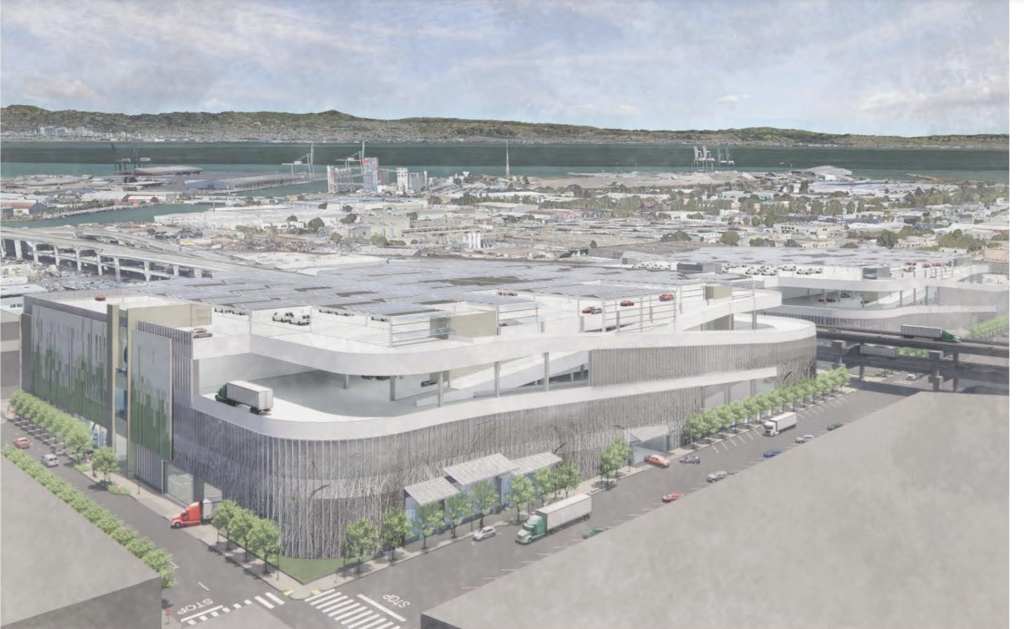One of the most dramatic, and problematic, changes in San Francisco over the past 30 years has been the conversion, legal and illegal, of light industrial space to offices.
Some of us warned many years ago that when you put all of the city’s economic eggs in one basket—downtown offices—you put the entire economy at risk.
Which is exactly what has happened.

The new structure would soar over I-280 and bring a lot of trucks to an areas with serious air-quality issues. Planning Department illustration.
So when I saw that the Planning Commission was considering a proposal from a developer to add 2.1 million square feet of what’s known as Production, Distribution, and Repair (or PDR) space on the edge of the Bayview, it seemed to be a fine plan. That project would create blue-collar jobs in a neighborhood where people need those jobs.
It would, according to the Planning Department’s Environmental Impact Report:
—Advance progress toward the City’s long-standing goals to preserve, upgrade, and expand PDR space, including those reflected in the General Plan,11Bayview Hunters Point Area Plan,12 Five-Point Plan for PDR (2012), 13Make to Manufacture Advanced Manufacturing Playbook (2016), 14Proposition X (2016), 15 and Economic Recovery Task Force Report (2020).16
—Replace functionally outdated PDR space on the project site with first-and best-in-class facilities and replenish the supply of PDR space in the City that has been displaced by other development.
—Redevelop underutilized property to make efficient use of existing utilities, circulation, and complementary uses in the surrounding PDR-2 zoning district.
—Use innovative design at a size and scale that accommodates a range of large and small PDR uses, and can adapt over time to different industries and market needs, including anticipated growing demand for parcel delivery and/or last-mile delivery services, in an economically feasible way.
—Site PDR uses in a dense infill setting to create employment near housing and reduce vehicle miles traveled for potential distribution uses.
—Using carbon-efficient construction techniques, develop a project with infrastructure that facilitates carbon-efficient vehicle fleets and operations as cost-effective technology becomes available.
Um, that last one got me: Carbon-efficient fleets “as cost-effective technology becomes available.” What’s that mean?
Well, you have to read more than 100 pages into the Environmental Impact Report to figure out what’s actually going on.
This “PDR” facility, it appears, is going to be primary an Amazon distribution center, or something very similar.
The document shows that 759,000 square feet of the new space will be devoted to “parcel delivery.” Add in parking and “vehicle circulation space” and 73 percent of the new facility will be about parcel delivery.
That, of course, could be UPS or the United States Postal Service, except that both of those already have large facilities in the immediate area. Amazon already has a presence at the Toland St. site.
So while the developer is promoting “maker space,” that’s just a tiny fraction of the project.
The EIR says that it will generate about 5,000 “person vehicle trips” a day. Some of that will be people driving to work, since the area is badly served by transit.
A lot will be diesel trucks and gas-powered vans coming and going to bring in and bring out parcels.
This is in a neighborhood that the EIR freely admits has an alarmingly high incidence of asthma and other diseases that are linked to car and truck exhaust.
Soon, they will be moving to use robot trucks.
Sup. Shamann Walton, who represents the district, is concerned about the project, and he told me that his office is keeping a close eye on it.
The commission will discuss the draft EIR, which you can read here, Thursday/7.
The Homelessness and Behavioral Health Select Committee meets Friday/8, and among the items on the agenda is a $241 million contract with the Tenderloin Housing Clinic for managing 16 supportive housing sites until 2026.
THC has done important work protecting and organizing tenants and fighting evictions in the Tenderloin, and elsewhere in the city, since Randy Shaw founded it as a tiny operation when he was a law student in 1980.
But now it’s a big operation, and the contract raises issues about the way nonprofit housing providers funded by the city evict their tenants. Critics say many of the evictions can be avoided, and send the residents back into homelessness.
Expect to hear some THC tenants demand that a contract this size includes more eviction protections. That meeting starts at 10am.
48hills events: This column focuses at lot on action at City Hall, but I’d like to add more community-based events. On Sunday/10, Sup. Dean Preston will appear at the Unitarian Universalist Forum to discuss “San Francisco: What is it’s future?” That forum starts at 9am, 1187 Franklin.
Please send notices of upcoming events to tim@48hills.org.




